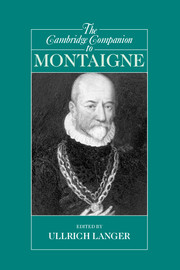Book contents
- Frontmatter
- 1 Introduction
- 2 Montaigne’s political and religious context
- 3 Montaigne’s legacy
- 4 Montaigne and antiquity
- 5 The Essays and the New World
- 6 Justice and the lawlaw: on the reverse side of the Essays
- 7 Montaigne and the notion of prudence
- 8 Montaigne and the truth of the schools
- 9 The investigation of nature
- 10 Montaigne and skepticism
- 11 Montaigne on moral philosophy and the good life
- Bibliography
- Index
5 - The Essays and the New World
Published online by Cambridge University Press: 28 May 2006
- Frontmatter
- 1 Introduction
- 2 Montaigne’s political and religious context
- 3 Montaigne’s legacy
- 4 Montaigne and antiquity
- 5 The Essays and the New World
- 6 Justice and the lawlaw: on the reverse side of the Essays
- 7 Montaigne and the notion of prudence
- 8 Montaigne and the truth of the schools
- 9 The investigation of nature
- 10 Montaigne and skepticism
- 11 Montaigne on moral philosophy and the good life
- Bibliography
- Index
Summary
Montaigne’ Essays are perhaps the first and greatest reflections on the impact of the discovery and colonization of the New World upon Europe and early modern consciousness. Oceanic travel and the effects of the Columbian discoveries mark the work indelibly. A seasoned reader may often wonder if the author’s project of self portraiture, in which he wishes that “I want to be seen here in my simple, natural, ordinary fashion, without straining or artifice” (“To the Reader,” F2, V3), could not be done without the newly found alterity or the discoveries brought from the New World. Montaigne does not expound on the marvel and wonder of new lands. Rather, he offers the first anthropological speculation on what the New World might be. He furnishes both imaginative and reasoned studies of the natural and human conditions of a world whose geographical limits were close to being determined and concluded. Montaigne makes clear the importance of the historical moment when God’s creation finds itself called in question: when, all of a sudden, in the gaps and crevasses of biblical and classical texts, a general incapacity to explain the very being of the New World casts authority in the shadows of doubt.
- Type
- Chapter
- Information
- The Cambridge Companion to Montaigne , pp. 74 - 95Publisher: Cambridge University PressPrint publication year: 2005
- 16
- Cited by

